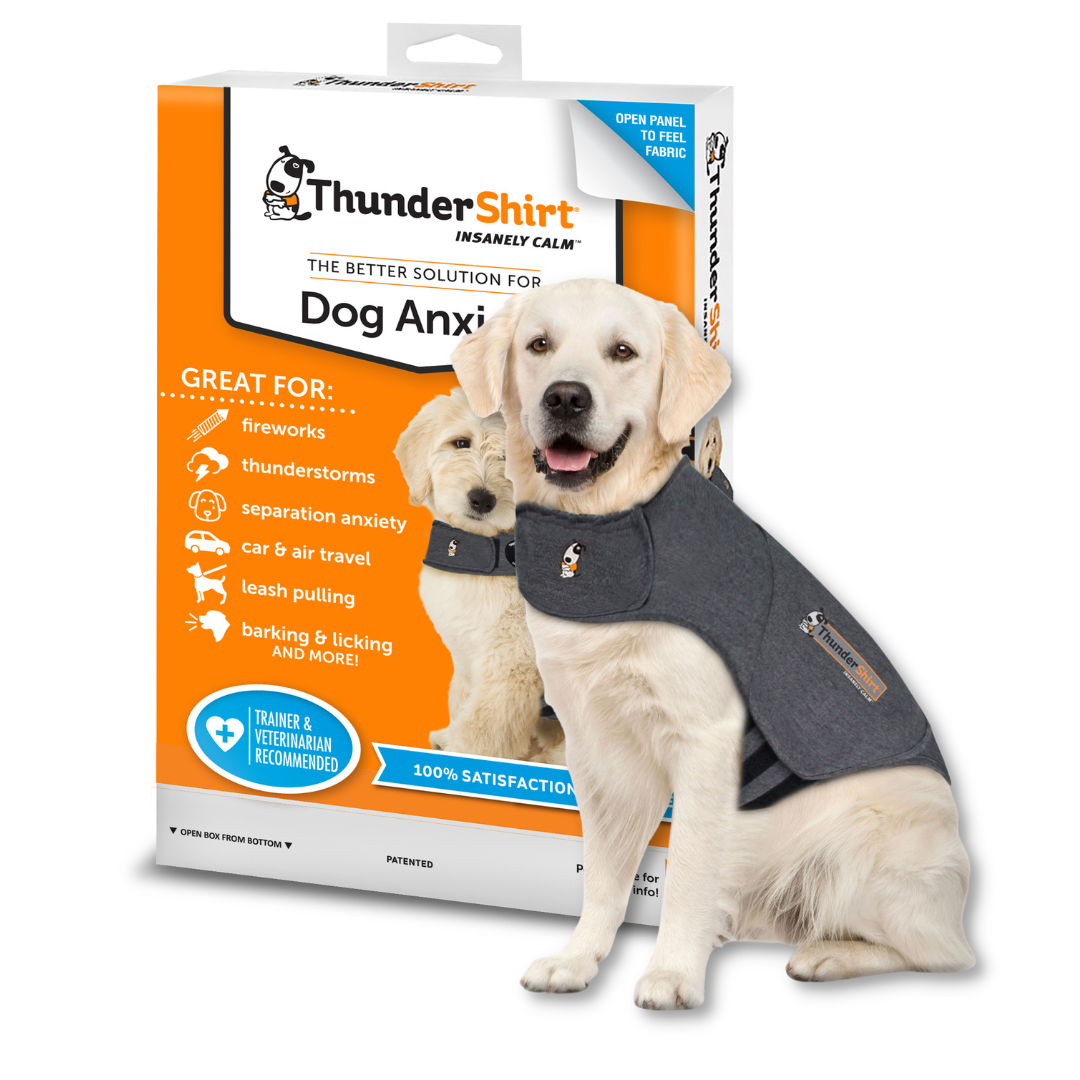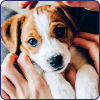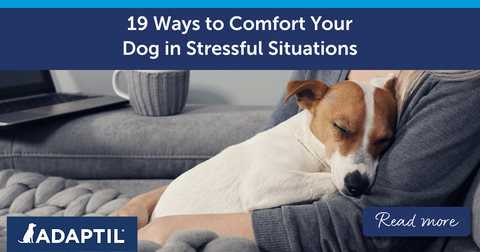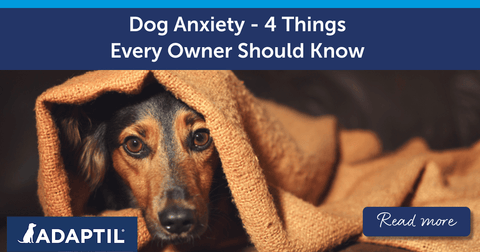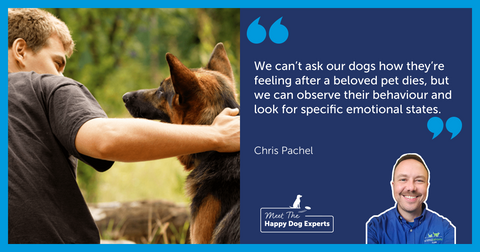Want to subscribe to our blog?
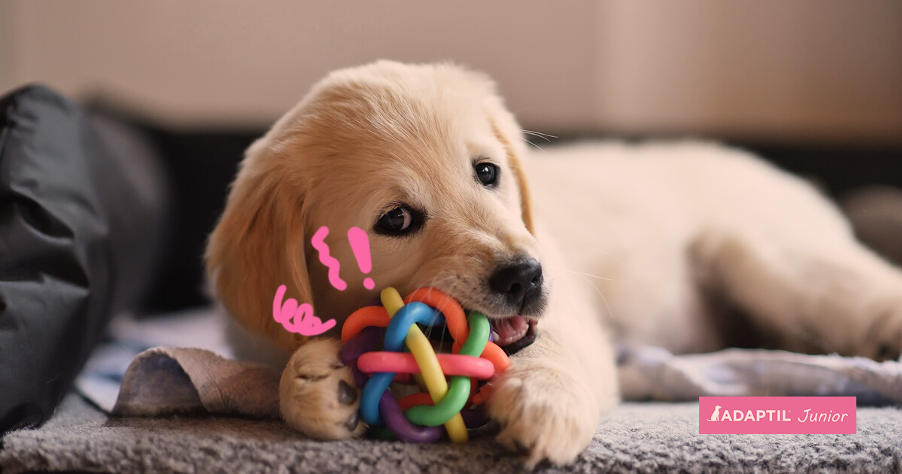
7 Puppy Play Tips to Limit Biting and Growling
Written by Adaptil, published on April 18, 2023
So, you've got a new bundle of fun in your life - an amazing little puppy! We all love to play with our pups. But if they suddenly start growling and biting during playtime it can be a little confusing!
While some biting and growling is normal - and part of puppy fun! - you should limit any excessive biting and growling as much as possible. Usually, when puppies are still with their siblings they will learn instinctively that biting can sometimes hurt and will quickly see when to be more gentle because they might cause other pups to whine! But they also need to learn not to bite humans once they arrive in your home as part of their basic puppy training.
The Importance of Puppy Playtime
As well as being great fun for you both, puppy playtime has many benefits for your pooch:
- Play is a great reward and treat to teach your pup the do's and don'ts of living with humans!
- Play gives physical exercise - whether it's throwing and fetching a ball or frisbee, or playing tug of war with a rope, this all provides fun, exercise and safe biting and growling.
- Regular playtime is a great way to strengthen the bond between you and build a strong relationship, which is very special.
- As well as physical exercise, playtime can also provide mental stimulation for your new friend. Stuffed Kongs, snuffle mats, and puzzle toys are all great for keeping your pooch mentally stimulated.
- Importantly, keeping your pet active and stimulated through play will avoid them biting and chewing your personal items out of boredom.
Knowing the difference between a playful growl and when your dog is in need of more space is also important. These helpful puppy play tips will help you and your new bundle of fun get the most out of playtime together!
1. Train & play at the same time!
Why not play and train at the same time? Puppies can often be excitable and jump up on their hind legs with their paws on you - but although it can be very welcoming, it can sometimes be frightening, especially if it's combined with play biting and growling. If they jump up, turn away immediately with your back to them or even walk away - they won't like the fact that you are ignoring them! Once they have all four paws on the floor, praise them and even give them a treat, holding it low down. They will soon realise that jumping up is not good!
2. No rough & tumble!
Avoid playing rough with your pooch and don't play push/pull with your hands - they will definitely respond with their teeth, thinking that this is OK and get into bad biting habits which you won't be able to break. Instead, only play this game with a rope toy - much safer for your hands and it will also teach them that only toys are for chewing!
Limit their rough and tumble time to playing with certain toys or their best doggy pals where they will bundle around and sometimes play-bite (mouth) each other. Growling and mouthing are normal when doggies play, but just keep a watchful eye to ensure the growling doesn't get aggressive.
3. Keep play low and slow!
When playing with your pup, avoid lifting toys up high. This will only encourage them to jump and, if they can't reach the toy they might resort to snapping or growling in order to get the toy. So keep playtime at close to ground level by, for example, rolling a ball along the ground so that they can chase it and bring it back for more! And if you can then teach them to 'drop', they've learned another trick and you have avoided any accidental bites!
4. Only play with doggie toys
You don't want your puppy to think they can play with humans, and your possessions, the way they play with other dogs or their toys. Ensure they have plenty of doggie toys to hand so that you can distract them with their own toys and avoid chewing you or your clothes.
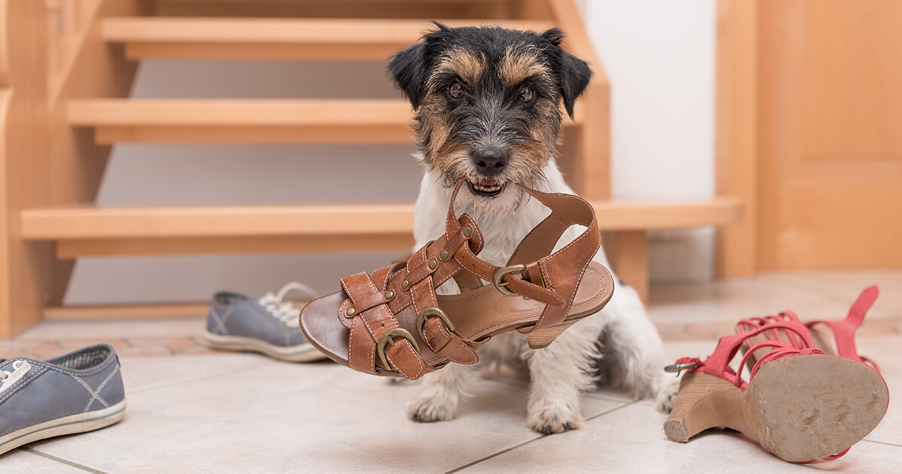
5. Teach them to be gentle
When a puppy is still with their litter, they will learn that biting is not good from the reaction of their siblings; other puppies will yelp or move away if they are not having fun. Try to continue this when you bring your puppy home. If they do bite or growl, ignore them or move away; if they continue to bite, you should also continue to ignore them and soon your puppy will get the message. Be sure to make a fuss and reward them when they are gentle so they know what's a good thing to do and what's not!
6. Use your voice - but not to shout!
Although dogs can't talk, they do understand what you say to them, so use some calm voice commands to show them that you are pleased with them, and avoid raising your voice, even if they have been naughty!
If they have bitten you (even though only in play) make sure your tone of voice reflects your command and stop playing that game. Use the same phrase all the time when stopping the game so that when they next hear it, they will know they have overstepped the mark and will stop.
However, avoid shouting at your pooch if they've done something wrong as this could frighten them and make them unsure of their relationship with you. Instead, ignore bad behaviour and only reward good behaviour by making a fuss of them and giving vocal encouragement.
7. Trick or treat?
Never trick your puppy! If your puppy responds positively to your commands or training, always reward them with a treat them especially if they stop biting. Tricking them into doing something with no reward will only discourage them from repeating it - but give them lots of praise and a treat for being good - this will give them a happy feeling which they will want to repeat.
Remember that biting and growling are natural behaviours for puppies but if they are left untrained, they can become serious problems when your puppy grows into a large dog.
Taking steps now to limit biting and growling whilst they are still young, cute and cuddly will ensure that you have a life long, stress-free friend when your pooch becomes all grown up. ADAPTIL Junior is scientifically proven to help to support your puppy as they play, learn and adjust to their new home; by providing comforting messages to reassure and comfort your pet.
Following our expert tips will help to ensure your bond with your dog goes from strength to strength.
Make sure to join our community for weekly advice from our dog behaviour experts as well as product offers and competitions.
 Related Posts
Related Posts
Legal notice The information collected is intended for Ceva Santé Animale and the group in order to manage your requests. This information can be shared with service providers in order to organize their management. In accordance with the General Data Protection Regulations, you have the right to access, rectify and limit the processing of your data. You can also, in certain cases, object to the processing, withdraw your consent and request the deletion and portability of your data. For any request in relation to your personal data, please visit this page.




















